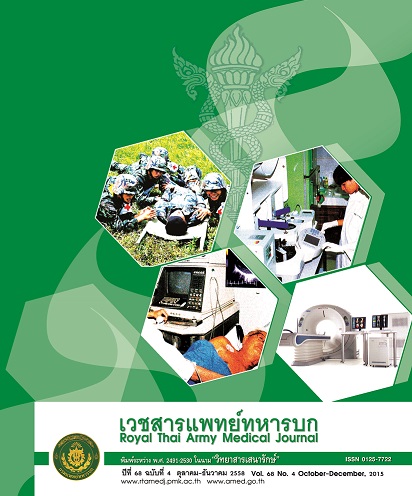Smoking Cessation: A Current Update from FCTC Article 14 Adoption in Thailand
Main Article Content
บทคัดย่อ
In recent years, the political recognition of the role of the World Health Organization’s Framework Convention on Tobacco Control (WHO FCTC) as a catalyst in the Thai health agendas is growing, including the promotion of multi-sectorial transnational cooperation, as the prevention and control of non-communicable diseases (NCD) from tobacco risk factors. This reviews the effect of tobacco control policies on the evidence-based 2nd strategies, with the aim of providing guidance on implementing National strategy tobacco control policy 2010 – 2014. Based on previous studies, we estimate the magnitude of effects of major tobacco control policies, how the successful campaigns have implemented a combination of tobacco control policies, how the effects
depend upon the manner in which the policies are implemented, and the barriers. The study employed a mixed methods design including review of documentation and policy reports, and an analysis of research productivity. Results reveal problem, obstacles, challenges and recommendation to be mentioned, outlining present tobacco control lessons learnt from FCTC article 14 adoption in Thailand,:including integrated mass media of tobaccocontrol issues that are essential to ensure social change, enforcement and formulation of the responsible structure that takes action for conducting the highly-effective and simple surveillance activities and, all systematic accessible tobacco cessation health-care services and tobacco cessation drugs.
การส่งเสริมให้ผู้บริโภคลดและเลิกใช้ยาสูบโดยตามนโยบายควบคุมยาสูบของ FCTC 14 ในประเทศไทย
ห้วงรอบปีที่ผ่านมาบทบาทของ WHO FCTC เป็นบทบาทที่สำคัญในวาระแห่งชาติของการสร้างเสริมสุขภาพในประเทศไทยไทยที่มีการส่งเสริมความร่วมมือในประเทศหลายรายสาขา เช่นการป้องกันและควบคุมโรคไม่ติดต่อ (NCD) ที่เกิดจากความเสี่ยงในการบริโภคยาสูบ ในบทความนี้แสดงเห็นของผลลัพธ์เชิงประจักษ์ที่เกิดขึ้นจากนโยบายการควบคุมยาสูบตามการดำเนินการตามกลยุทธ์แห่งชาตินโยบายควบคุมยาสูบปี พ.ศ. 2553-2557 ในส่วนของการดำเนินงานในกลยุทธ์ที่ 2 ทั้งนี้จากการศึกษาก่อนหน้า เราได้ประเมินการผลของการควบคุมการบริโภคยาสูบที่สำคัญ ว่ามีนโยบายหรือโครงการที่ประสบความสำเร็จ ที่ดำเนินการตามนโยบายการควบคุมยาสูบ การดำเนินการและอุปสรรคที่เกิดขึ้น การศึกษาใช้วิธีการตรวจสอบเอกสารรายงานการดำเนินนโยบายของประเทศ รวมถึงการทบทวนเอกสารและรายงานเชิงวิเคราะห์ ผลการศึกษาได้กล่าวถึงปัญหาอุปสรรค ความท้าทายและข้อเสนอแนะในข้อสรุปตอนท้ายของบทความ โดยสรุปการดำเนินงานตามกรอบนโยบายควบคุมยาสูบของ FCTC 14 ในปัจจุบัน มีดังนี้ : การบูรณาการงานสื่อสารมวลชนของปัญหาการควบคุมยาสูบในประเทศไทยเป็นสิ่งจำเป็นเพื่อให้แน่ใจว่ามี การดำเนินกิจกรรมในเรื่องการเฝ้าระวังในการบริโภคยาสูบโดยใช้เปลี่ยนแปลงทางสังคม การบังคับใช้และการกำหนด โครงสร้างผู้รับผิดชอบที่จะดำเนินการอย่างชัดเจนและมีประสิทธิภาพ และสร้างระบบที่สามารถเข้าถึงง่ายของระบบบริการและยาที่ช่วยการเลิกยาสูบ
Downloads
Article Details
บทความในวารสารนี้อยู่ภายใต้ลิขสิทธิ์ของ กรมแพทย์ทหารบก และเผยแพร่ภายใต้สัญญาอนุญาต Creative Commons Attribution-NonCommercial-NoDerivatives 4.0 International (CC BY-NC-ND 4.0)
ท่านสามารถอ่านและใช้งานเพื่อวัตถุประสงค์ทางการศึกษา และทางวิชาการ เช่น การสอน การวิจัย หรือการอ้างอิง โดยต้องให้เครดิตอย่างเหมาะสมแก่ผู้เขียนและวารสาร
ห้ามใช้หรือแก้ไขบทความโดยไม่ได้รับอนุญาต
ข้อความที่ปรากฏในบทความเป็นความคิดเห็นของผู้เขียนเท่านั้น
ผู้เขียนเป็นผู้รับผิดชอบต่อเนื้อหาและความถูกต้องของบทความของตนอย่างเต็มที่
การนำบทความไปเผยแพร่ซ้ำในรูปแบบสาธารณะอื่นใด ต้องได้รับอนุญาตจากวารสาร


